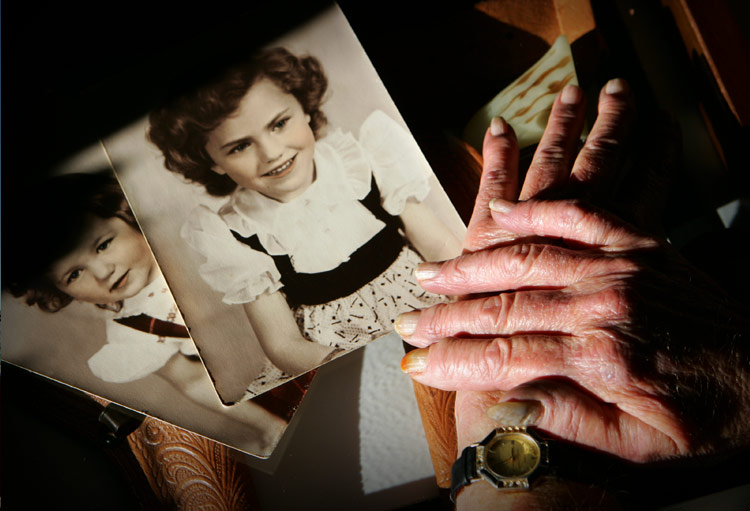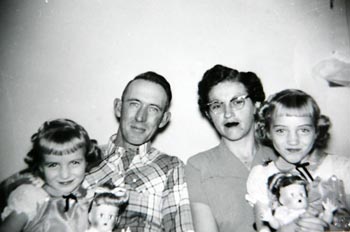







Crossing chapters
Jump to:Related content

Crossing forums
 Forum at the Rocky Mountain News in Denver.
Forum at the Rocky Mountain News in Denver.
 Forum at the Union Colony Civic Center in Greeley.
Forum at the Union Colony Civic Center in Greeley.
Podcasts:
Acknowledgements
"The Crossing" could only be told with the help of many people:
- The more than 80 people touched by the tragedy of Dec. 14, 1961, who agreed to tell their stories.
- Bill and Mary Bohlender, who helped unearth numerous historic documents and provided numerous insights.
- Virginia Shelton and Mary Shelton Shafer, who provided numerous insights and access to attorney Jim Shelton's files.
- Keith Blue, who provided numerous insights.
- Peggy Ford and the staff at the City of Greeley Museums, Barbara Dey and the Hart Library staff at the Colorado History Museum and former Rocky librarian Carol Kasel, who all assisted with research.
Contact the series team
- Reporter: Kevin Vaughan
- Photographer: Chris Schneider
- Video: Tim Skillern & Laressa Bachelor
- Print designer: Armando Arrieta
- Web designer: Ken Harper
- Web producer: Forrest Stewart
- Web developer: Chris Nguyen
- Copy editor: Dianne Rose
- Photo editor: Dean Krakel
- Imager: Marie Griffin
- Interactive editor: Mike Noe
- Project editor: Carol Hanner
Ed and Betty Heimbuck and Jim and Alice Paxton didn't know each other well as the winter of 1961 approached, but their lives were mirror images.
Both couples farmed.
Both cherished their two daughters.
The Heimbucks had Kathy and Pam. The Paxtons had Marilyn and Jan.
In each family, the girls were wildly different. Kathy Heimbuck loved dresses and jewelry. Pam Heimbuck didn't need much more than a pair of jeans and boots and a cowboy hat. Marilyn Paxton approached everything as though it was a major project. Jan Paxton floated through life, never too worked up about anything.
The Heimbuck girls named their Pekingese "Little Pete."
The Paxton girls named their Pekingese "Toyling."
Both had another dog, a mutt, they'd adopted.
Then, on Dec. 14, 1961, all four girls died when a Union Pacific train tore through the last few feet of their school bus.
In the years that followed, through the struggle to find a new life, the Heimbucks and the Paxtons found each other.
'In my mind constantly'
So much time has passed. And so little.
"I feel close to the girls always," Betty Heimbuck says, sitting on one side of the couch in the immaculate LaSalle home where she and Ed have lived since they left the farm two decades ago. "They're in my mind constantly."
"I know some people would think, 'My God, it's been 45 years, get a grip,' but it doesn't seem that long."
And so, always, the girls are only a memory away. Like the day Pam chattered away at her mother's feet until Betty could no longer take it.
"Pam, my ears hurt," she said that day. "Please be quiet."
And Pam looked up and said, "Yes, but my mouth likes to talk."
Or the days when Betty would divide up the chores, assigning some to Kathy, some to Pam and some to herself. On those days, pretty soon she'd hear Kathy's exasperated voice: "Mom, where's Pam at?" She'd look out, and the barn door would be open, and Pam would be off someplace on her Shetland pony, Dopey. Little Pam loved Dopey, and she took him a treat every day — a carrot, an apple, a cookie.
They remember how different the girls were.
Kathy was a little lady. Nice perfume. Cooking and sewing with her 4-H club — the "Auburnettes."
Pam was a tomboy. Toy pistols. Jeans. Standing next to Ed and saying, "Daddy, saddle my pony." Learning, one day, to do it herself.
Bronzed shoes
Alice Paxton's girls are nearby, in her heart, too.
She lives alone now — Jim died in November 2005 after a short, difficult illness brought on by a stomach infection.
But the memories of their girls are on display in the glass case just off the kitchen in her tidy home on the east side of Pierce, north of Greeley. On one shelf rest seven pairs of shoes, all of them bronzed. A pair of baby shoes for each girl. And dancing shoes — two pairs of Marilyn's, three pairs that belonged to Jan. Around them sit dance trophies, music awards, colorized school portraits.
Jan was the first to pick up dance. She was 4 or 5 when she went to her first dance class, and pretty soon Marilyn joined her. They tap-danced. They danced "modern." Jan even tried ballet.
In dance, as in everything else, they were so different.
Marilyn, the quiet, studious girl who was always involved in her work, took very precise steps.
Jan, the carefree girl who didn't let much bother her, pranced around.
"She had tennis shoes," Alice says, talking about Jan's attempt at ballet. "She'd walk around on her tiptoes in her tennis shoes."
As she says this, Alice laughs, and lifts her hands up and walks through the air with her fingers.
A terrible Christmas
On Dec. 14, 1961, Kathy Heimbuck was 12, Marilyn Paxton was 13, and both were eighth-graders at Meeker Junior High. Pam Heimbuck was 9, a fifth-grader at Delta Elementary School. Jan Paxton was 11, a sixth-grader.
In the few seconds it took for the thundering train to bash into the bus, all four were gone.
Finding a way to exist after such loss was a struggle for both couples. Eleven days after the accident, they faced Christmas without their girls.
The Heimbucks also had to steel themselves for Pam's birthday on Dec. 27, then Kathy's on Dec. 30.
The reminders were everywhere. Each afternoon, Blackey, the landlord's puppy who'd been adopted by Kathy and Pam, wandered out to the road around 3:30, waiting for the school bus and the girls who never came home.
Ed went back to work in the fields where he grew beets, beans, grain, corn and hay. When Betty felt the walls closing in, she sought consolation from Katherine Brantner, another mother who lost two children in the crash.
After the accident, the Heimbucks remained on the farm where they'd lived all their marriage, down the road from the Auburn school. In 1963, Ed took a job in nearby LaSalle with a company that manufactured fertilizer. It was, he acknowledges now, an effort to get away from the accident and the sadness.
But in 1964, he went back to farming the 80-acre plot where Kathy and Pam had romped with their animals. Then in 1968, he and Betty moved to a farm closer to LaSalle and began growing potatoes.
They retired in the mid-1980s and moved into town.
For the Paxtons, the journey was no easier.
"We had a terrible time after the girls were killed," Alice Paxton says. "We didn't know what we wanted to do. We took it awful hard. It just ruined our whole lives.
"Nothing was ever the same after that."
Friendship
Each afternoon, Chip, the German shepherd mix who'd been adopted by Marilyn and Jan, did the same thing Blackey did at the Heimbucks' house. He wandered out to the road around 3:30, waiting for the school bus.
In the months after the accident, the Paxtons sold the farm near Auburn. Jim drove a truck for a year, then went back to farming. Alice couldn't just sit around the house, so she went to town to work.
She took a job at Cook's Drug Store, then at Denver Dry, then at Hested's Department Store, then at State Bank.
She took night courses in accounting. Eventually she got a job in the accounts receivable department at the Monfort meatpacking plant, where she worked for 10 years before retiring.
"I just had to make something of myself," she says. "I just had to do something."
Jim eventually returned to trucking, driving his rig until the day he got sick in August 2005.
Neither couple ever had any more children.
Along the way, the Heimbucks and the Paxtons found each other.
They were barely acquainted before Dec. 14, 1961. After that day, they understood each other better than anyone else could.
They spent holidays together for decades. Thanksgiving at the Heimbucks. Christmas at the Paxtons. Together, they relished the memories of their girls.
They freely expressed their hard feelings for bus driver Duane Harms, the man they all believe took their girls from them. And they share something else — disdain for that psychological term so often tossed around after tragedies: "closure."
For them, there was no magic moment, no line in their lives where they said, "I'm OK now." Their wounds still hurt.
"There's never closure," Betty says. "They say time heals, and it does. But it takes a long time and it's gradual."
"It's always there," Alice says. "It never goes away."
It's been 45 years, and it's still Dec. 14, 1961.
They're still at the crossing.
NEXT: Dec. 14











